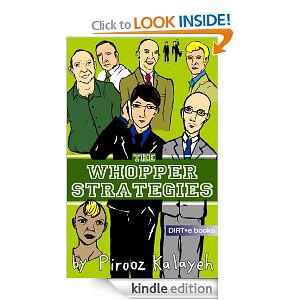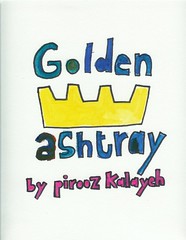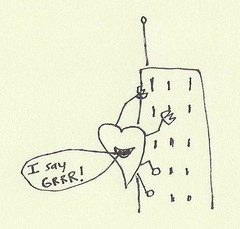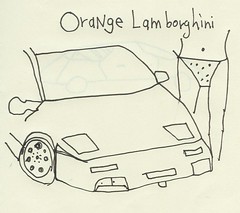The following is a discourse with Jeff Encke. His poems in Typo #5 caught my attention. At first, I thought they were derived from Sufi literature. They were filled with love and passion. As I found out, it was something altogether the same and different.
If you would like to read the poem which catalyzed this discourse, please visit Typo #5, or to purchase Jeff's works visit Matlub
>>>>>>>>>>>>>>>>>>>
On May 27th Kalayeh wrote:
Dear Jeff,
I was curious about your poems in Typo. Are they cut-ups of Sufi
literature? Why the names preceding them? Are they some type of
translation?
Best,
Pirooz M. Kalayeh
>>>>>>>>>>>>>>>>>>>>>>>>>>>>>>>>>>>>>
On May 26, 2005, at 2:10 PM, Jeff Encke wrote:
Hi Pirooz,
The titles are taken from the names of the "most wanted" figures on
the US Department of Defense's 2003 "Deck of Doom" playing cards. The
writing's my own. No cut-ups involved. I conceived of them as
reminiscing love letters. I may have explained it better at my website.
Hope that helps!
Regards,
Jeff Encke
>>>>>>>>>>>>>>>>>>>>>>>>>>>
Dear Jeff,
Thanks for the info. It's a cool idea. Did you write the poems with a
card in front of you? Or were the poems written before the connection
to "matlub"?
Best,
Pirooz
>>>>>>>>>>>>>>>>>>>>>>>>>>>>>>>
On May 28, 2005, at 3:57 AM, Jeff Encke wrote:
Howdy Pirooz,
No, I wrote the poems without the cards in front of me, although I
knew what I planned to do with them afterwards.
I have a longstanding interest in the way names function in personal,
social, and political environments as empty vessels that we encumber
with historical fact, truth, rhetoric, and feeling, such that they
become nodes in a sea of discourse about power, and the actions of
prime movers (authors) get lost in the shuffle. Am I showing my cards
too soon? (viz. Foucault)
The underlying critique, I suppose, was that the figures on the
Department of Defense's deck were rather anonymous to me and most of
those I know in the United States -- even Saddam Hussein was but a
caricature of himself, readymade for manipulation and consumption
here -- which is not to say that I dispute, much less forgive, the crimes
ascribed to the individuals themselves, but that I do not feel
comfortable mindlessly consuming the political rhetoric attached to
their names.
To consume the "Deck of Doom" playing cards' rhetoric without
circumspection would have been tantamount, in my mind, to committing
an act of racism, the very racism that impedes open cultural
communication between Middle Eastern Muslims and North Americans --
as well as the direly needed revision of lines of power and
understanding. Most Wanted: A Gamble in Verse, the playing cards
version of the book, therefore incorporates thematically pertinent
images and symbols of colonialism, racism, genetics, cultural
artefacts, etc.
All names of public figures, the author's name notable among them,
serve as discursive nodes, as receptacles of knowledge, truth, and
feeling. The name serves a similar function in the context of
intimacy, where lovers project meanings, ideal forms, hopes, fears,
figments of self-identity, and so on onto their beloveds, who are in
some sense inevitably anonymous figures in their lives, even when a
couple has been together 30 years. Even the beloved's face is a
perpetual clean slate.
Consequently, in writing the series of poems, I wove together
personal histories and sociopolitical ruminations, and the names of
the anonymous "Most Wanted" in Iraq seemed to deserve these more than
any other names, precisely because these names were meant not to be
loved. On the contrary, their birth into social discourse in the
United States and elsewhere demanded that they be invested with hate.
Of course, the phrase "most wanted" captures both sides of the ironic
coin: one's love for the "most wanted" beloved and one's disgust and
hatred for the "most wanted" criminal.
Out of curiosity, what's your interest in the work? Are you a poet as
well? I would interested in carrying on and fleshing out this
conversation.
Regards,
Jeff
>>>>>>>>>>>>>>>>>>>>>>>>>>>>>>>>>>>>>>>>>>
Dear Jeff,
I love the questions this raises in me. What about loving that which is
loved? Britney Spears cards? Or even poems on the Beloved? What kinds
of questions does this raise in a spiritual journey? Is identity
dependent on what we love or hate? I know that I get great joy in
liking cheesecake. I love cheesecake. Does this mean I have a false
sense of identity? Not for me. I love cheesecake. It tastes good. End
of story.
Of course, tomorrow I might not like cheesecake. I might like falafel
more. In that moment, falafel is the bomb. I am all about it.
Is this my identity? I am a falafel lover. Maybe, in that moment I am.
I am certainly not going to judge myself for that. I am just going to
say, "Cool, then go to the falafel stand. Get a falafel."
Even if see a commercial for McDonald's after I have a falafel in my
hand, and I think to myself, "Maybe, a Big Mac would be better" - I
would not feel like I have wronged anyone or anything. I am holding my
personal integrity. I preferred fast food. Great. Enjoy it.
Can I blame the commercial for my personal tastes? Is it their fault?
Is this true? No, I like Big Macs. They are good. Can I blame my ethnic
upbringing for my love of falafel? No, I like falafel. It's nutirtious
and delicious. Can I look around the streets of New York, and say,
"Damn you beautiful bakeries!" No, cheesecake is the most tasty treat I
can think of. It coats my tongue with sugar. I like that.
I could choose to look at everything as false:
This person I love is not me. I will die alone. The only person that
matters is me.
The beloved loves everything. He is inside me. He wants me to smile.
This world. It hurts. It is filled with corruption and chaos.
My only problem, (and may I stress that this is how I see things), is
that I cannot know any of this is true for anyone but myself. And, in
myself, I cannot know that any of the above statements are true either.
I am not dead. I am not the Beloved. And I do not have any concept of
the entire world or every living being. I cannot possibly know.
This leaves me back where I started. I like cheesecake. At the moment,
I'm thirsty. I want a glass of water. That's it. Nothing else.
What do you think?
Best,
Pirooz
>>>>>>>>>>>>>>>>>>>>>>>>>>>>>
Hi Pirooz,
I think we're on the same page. For me, it's not a question of
fundamentally doubting choice, taste, or the existence of the other,
nor the way these elements influence one's identity. I am simply
interested in the function of language in these ostensibly ethical
narratives, be it whether to love, hate, prefer fastfood, adore a pop
star, whatever. It is the habit of human beings -- at least in this
culture, from what I can observe -- to say they despise or love an
author, a president, an Iraqi criminal, a famous actor -- and each of
these objects of feeling has a name that accrues narrative knowledge
through newspaper articles, television shows, consumer products,
casual conversations, e-mails, etc.
But to what extent does the public name signify the individual? And
to what extent does it signify a series of narratives and
corresponding truths circulating in a society, by whatever means? What
does the name "Bush" mean to Sunni Muslims in Iraq, on average?
Imagine we could take a survey. To what extent would the meaning
associated with that name correspond to the meaning associated with it
by the "average American"? What does the name "Shakespeare" signify?
Or Britney Spears? Or Saddam Hussein? Or Prince (a musical artist
whose awareness of the function of the public name led him to abandon
it for an unspoken symbol for some time)?
The problem of free will, the dangers of solipsism, and the
inevitability of uncertainty when it comes to knowledge of the world
and ourselves are all ultimately metaphysical/phenomenological
questions much larger than what I had hoped to address with the
playing cards project, which was not, incidentally, meant to provide
any hard-and-fast answers. I appreciate those questions, though, and
struggle with them myself.
Cheers,
Jeff
>>>>>>>>>>>>>>>>
Right on, Jeff.
I hear you. The only answer I have discovered for myself is that, "I am
only as cool as you are."
When someone says they are angry with me, I think, "I am only as angry
as you are."
When someone says they hate X, Y, Z, I think, "They only hate X, Y, Z
as much as they hate themselves."
When someone says I am being controlled by media and commercials, I
think, "I am only being controlled as much as they are."
If people say my name is synonymous with hate and wretchedness, I
think, "I am only as hateful and wretched as you are."
This awareness changes my perception of myself. It reminds me that I am
not anyone but me, and that I'm, simultaneously, everyone else as well.
Your poems are great teaching tools for me. I have learned a lot for
them. Thank you for writing them. I would be very interested in what
comes next from you. Please keep me posted. I will do the same for you.
It would also be great to share our discourse on my blog. I would be
interested to see how the artists in my circle respond, and what shifts
will occur. It may also be fun to interview each other for the same
purpose. Let me know what you think.
Best,
Pirooz
>>>>>>>>>>>>>>>>>>>>>>>>>>>>>>>>>>>
Jeff Encke is currently at work on several books, including two full-length collections of verse, Most Wanted, from which he excerpted this deck of poetry playing cards, and Hydrography, a volume of water-related poems; two chapbooks, Sinking and Eunuch Shower Song, the second of which C.D. Wright selected as runner-up in the Poetry Society of America’s inaugural National Chapbook Fellowship competition; a revision of his doctoral dissertation, Manifestos: A Social History of Proclamation; a study of the influence of technological innovation on the production and reception of art, Rogue Magic; an anthology of manifestos; and a translation from the Italian of Paolo Baglione, an unfinished play by Futurist poet F.T. Marinetti. His poetry has appeared in various national journals, including American Writing, Barrow Street, Black Warrior Review, Colorado Review, Cream City Review, Octopus, Salt Hill, 3rd Bed, and Quarterly West.
Subscribe to:
Post Comments (Atom)












1 comment:
Pirooz, enjoyed this. Enjoyed how this discussion dared to addres a common (commoN? maybe - shared) set of questions, but doesn't seek some joint resoultion, some one point where it all comes together or falls apart. nice, in that, something i struggle with. a live presentation of difference.
Post a Comment